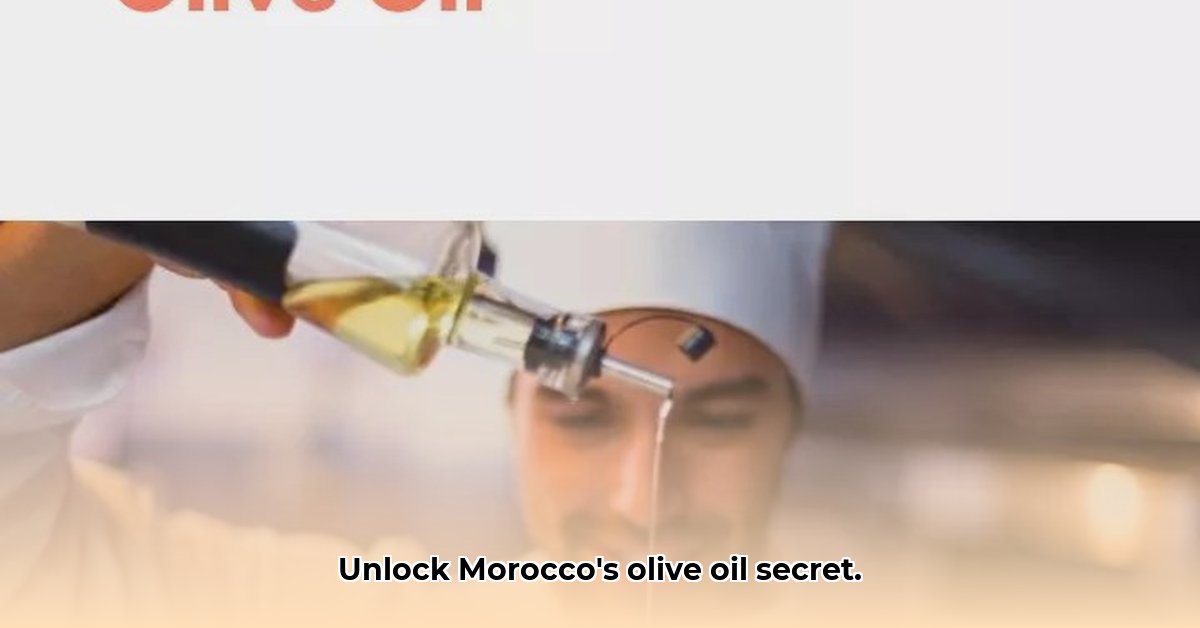
Benefits of Moroccan Olive Oil: A Taste of Sustainability and Health
Morocco's olive oil industry is experiencing a remarkable surge, capturing global attention for its high-quality products and sustainable practices. This isn't just about delicious food; it's a story of sun-drenched landscapes, ancient traditions, and a commitment to a healthier future. Let's explore why Moroccan olive oil deserves a prominent place in your pantry.
Unveiling the Health Advantages of Moroccan Olive Oil
Moroccan olive oil, like its Mediterranean counterparts, offers a wealth of health benefits. It's rich in monounsaturated fats – the "good" fats that support cardiovascular health. These fats can lower LDL ("bad") cholesterol levels and reduce the risk of heart disease. Beyond heart health, it's packed with antioxidants and polyphenols – powerful compounds that combat inflammation, a factor in many health problems.
Studies suggest a potential link between regular olive oil consumption (including Moroccan varieties) and reduced cancer risk. While research is ongoing, particularly regarding specific Moroccan olive oil varieties, existing evidence strongly supports the overall health benefits of olive oil. There's also promising research suggesting potential neuroprotective effects, potentially mitigating cognitive decline and certain neurological diseases. Further research is needed to fully define these benefits. The unique polyphenol profile in Moroccan olive oil, influenced by the region's soil, climate, and olive cultivars, may offer distinct advantages compared to other olive oils.
Sustainable Practices: A Harvest of Goodness from the Atlas Mountains
The appeal of Moroccan olive oil extends beyond health; it's intrinsically linked to sustainable farming. Many producers actively minimize their environmental impact. Picture sun-drenched groves across the Atlas Mountains, where ancient techniques blend with modern innovation. Water-efficient irrigation systems conserve this precious resource, while integrated pest management reduces reliance on harmful chemicals.
Preserving biodiversity is a core value. This means fostering diverse plant, insect, and other life within the ecosystem. Instead of solely maximizing olive yield, the focus is on long-term environmental health. Many Moroccan producers have earned organic and Fair Trade certifications, demonstrating commitment to minimizing pesticide use, ensuring fair wages, and upholding ethical working conditions. Choosing certified products directly supports these responsible practices. The methods employed are a harmonious blend of traditional techniques and modern advancements, enhancing efficiency and environmental stewardship.
Challenges and Opportunities for the Future of Moroccan Olive Oil
Despite its success, the Moroccan olive oil industry faces challenges. Global competition is fierce, demanding consistently high quality. Climate change poses a significant threat, impacting yields and olive quality. Maintaining biodiversity among olive varieties is crucial for resilience against disease and environmental shifts.
These challenges also fuel innovation. Investing in research and development can lead to drought-resistant olive varieties better suited to changing climates. Strengthening farmer cooperatives empowers producers to secure better prices and invest in sustainable infrastructure. Collaboration between producers and consumers ensures the industry's continued growth while upholding environmental responsibility. Value-added processing methods also expand market opportunities.
Stakeholder Perspectives: A Collaborative Approach
The success of the Moroccan olive oil industry relies on collaboration.
| Stakeholder | Short-Term Goals | Long-Term Vision |
|---|---|---|
| Growers | Higher yields, improved market access, fair prices | Sustainable farming practices, economic prosperity, community growth |
| International Buyers | Consistent supply of high-quality, ethically sourced oil | Long-term partnerships, promotion of sustainable production |
| Moroccan Government | Industry growth, sustainable agriculture promotion | Economic diversification, strengthening the rural economy |
| Consumers | Healthy, delicious, and ethically sourced olive oil | Support for sustainable practices, informed purchasing decisions |
Navigating Risks and Ensuring a Sustainable Future
Potential threats to the industry's sustainability exist; however, proactive strategies can mitigate these risks.
| Risk | Mitigation Strategy |
|---|---|
| Intensive Farming | Promote sustainable land management, agroforestry |
| Monoculture | Encourage diverse olive cultivation and crop rotation |
| Climate Change Impacts | Develop drought-resistant varieties, implement water conservation |
| Market Volatility | Strengthen farmer cooperatives, explore value-added products |
Conclusion: A Delicious Choice for a Healthier Planet
Choosing Moroccan olive oil isn't just about enjoying a delicious and healthy product; it's about supporting a sustainable agricultural system that benefits both people and the planet. The industry's commitment to responsible practices ensures that the rich tradition of Moroccan olive oil production continues to thrive for generations to come. By making informed purchasing decisions, we can all contribute to a more sustainable future.